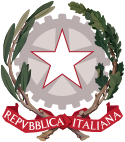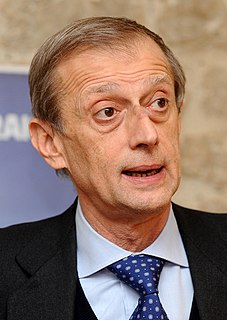The 2011 Italian local elections were held on 15–16 May, with a second round on 29–30 May. In Italy, direct elections were held in all 1,177 comuni and 11 provinces: in each comune were chosen mayor and members of the City Council, in each province were chosen president and members of the Provincial Council. Of the 1,177 comuni, 30 were capoluoghi and only 105 had a population higher than 15,000 inhabitants.

Italy, officially the Italian Republic, is a country in Southern Europe. Located in the middle of the Mediterranean Sea, Italy shares open land borders with France, Switzerland, Austria, Slovenia and the enclaved microstates San Marino and Vatican City. Italy covers an area of 301,340 km2 (116,350 sq mi) and has a largely temperate seasonal and Mediterranean climate. With around 61 million inhabitants, it is the fourth-most populous EU member state and the most populous country in Southern Europe.

The comune is a basic administrative division in Italy, roughly equivalent to a township or municipality.

In Italy, a province (provincia) is an administrative division of intermediate level between a municipality (comune) and a region (regione). From 2015, the provinces were reorganized into "institutional bodies of second level", with the birth of 10 special Metropolitan cities. A further 4 such cities were added later.
In Sicily the elections were held on 29–30 May, with a second round on 12–13 June.

Sicily is the largest island in the Mediterranean Sea and one of the 20 regions of Italy. It is one of the five Italian autonomous regions, in Southern Italy along with surrounding minor islands, officially referred to as Regione Siciliana.
Citizens living in Italy who were 18 or over on election day were entitled to vote in the local council elections. The deadline for voters to register to vote in the 15–16 May elections was midday on Saturday 15 April 2011.
Voting System
The voting system is used for all mayoral elections in Italy, in the city with a population higher than 15,000. Under this system voters express a direct choice for the mayor or an indirect choice voting for the party of the candidate's coalition. If no candidate receives at least 50% of votes, the top two candidates go to a second round after two weeks. This gives a result whereby the winning candidate may be able to claim majority support, although it is not guaranteed.
The election of the City Council is based on a direct choice for the candidate with a preference vote: the candidate with the majority of the preferences is elected. The number of the seats for each party is determined proportionally.
This page is based on this
Wikipedia article Text is available under the
CC BY-SA 4.0 license; additional terms may apply.
Images, videos and audio are available under their respective licenses.

Italy of Values is a centrist, populist and anti-corruption political party in Italy. The party was founded in 1998 by former Mani pulite prosecutor Antonio Di Pietro, who entered politics in 1996 and finally left the party in 2014. IdV has aimed at gathering and giving voice to different sectors of the Italian society. From the beginning of its existence one of its major issues has been the so-called "moral issue". However, in early 2010s IdV was eclipsed by the new-born Five Star Movement, founded by comedian Beppe Grillo, which used the same populist and anti-corruption rhetoric.

Letizia Moratti is an Italian businesswoman and former politician. She is the former mayor of Milan and current chairwoman of the management board of UBI Banca.

A number of elections for the renewal of both municipal councils and mayors were held in Italy on May 28 and 29 2006. Notably, these election regarded the four biggest cities in the country, Rome, Milan, Naples and Turin. Other relevant cities where municipal elections were held included Cagliari, Varese, Novara, Ravenna, Rimini, Ancona, Siena, Salerno and Catanzaro.
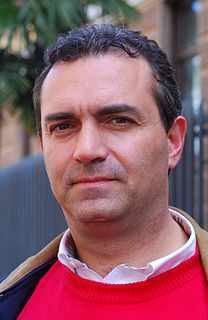
Luigi de Magistris is an Italian politician and a former prosecutor, currently the mayor of Naples.
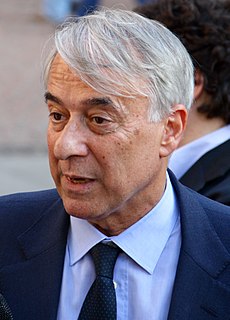
Giuliano Pisapia is an Italian lawyer and politician, twice member of the Parliament and former Mayor of Milan. As a politician, he has been a member of two left-wings parties, first Proletarian Democracy and then the Communist Refoundation Party; in Milan's mayoral election, he was endorsed by a large left-wing coalition, after winning the primary election of the Centre-left with the strong support of Nichi Vendola's Left Ecology Freedom. As a lawyer, he participated in a number of notable trials with political implications, including that of PKK leader Abdullah Öcalan and the trial that followed the death of anti-global activist Carlo Giuliani, shot by the police during the 27th G8 summit.
Giustina Mistrello Destro is an Italian politician and entrepreneur.
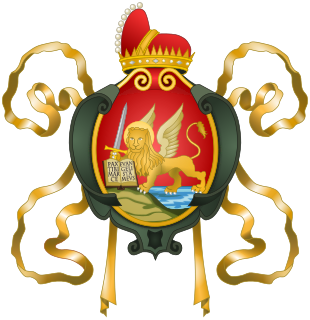
The Mayor of Venice is an elected politician who, along with the Venice’s City Council of 36 members, is accountable for the strategic government of Venice in northern Italy.
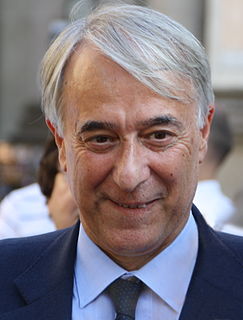
Municipal elections were held in Milan on 15–16 and 29–30 May 2011, at the same time as Italian local elections.

Civil Revolution was a left-wing coalition of political parties in Italy.

Indirect presidential elections were held in Italy between 18 and 20 April 2013. The result was the re-election of Giorgio Napolitano, the first time a President had been elected for a second term.
Citizens of Milan elect every five years the Mayor of the city, presidents and members of 9 districts's assemblies and 48 members of the City Council, which controls Mayor's policy guidelines and is able to enforce his resignation by a motion of no confidence.

Municipal elections were held in Milan on 5 and 19 June 2016 to elect the Mayor of Milan and the 48 members of the City Council.
Democracy and Autonomy is a political party in Italy, based in Campania. Its founder and leader is Luigi de Magistris, current mayor of Naples and former MEP for Italy of Values.

Together, whose complete name is Italy Europe Together, was a broadly progressive coalition of political parties in Italy, part of the centre-left coalition for the 2018 general election.

Progressive Area is a democratic-socialist political party in Italy.

Giulio Santagata is an Italian politician, former member of the Italian Chamber of Deputies and leader of Together.
Municipal elections were held in Milan on 28–29 May 2006, at the same time as other Italian municipal elections. The main candidates were the former Minister of Education Letizia Moratti, supported by Silvio Berlusconi's House of Freedom, and the prefect Bruno Ferrante, supported by The Olive Tree.
